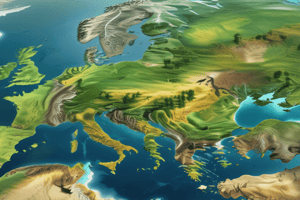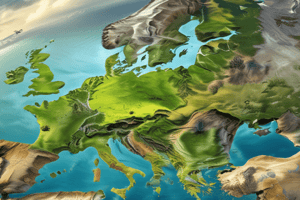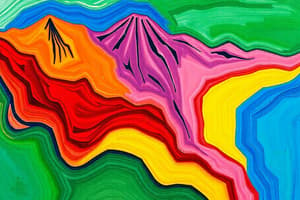Podcast
Questions and Answers
भूभागीय भूगोल का क्या महत्व है?
भूभागीय भूगोल का क्या महत्व है?
भूमि के दृश्य, सुविधाएँ और गतिशील प्रणालियों को समाहित करना।
भूभागीय भूगोल क्या समझता है?
भूभागीय भूगोल क्या समझता है?
भूमि, पानी, हवा और जीव जंतुओं के बीच के अंतराक्रियाओं का समझना।
क्या क्या रूप परिस्थितियों पर भूभागीय भूगोल केंद्रित है?
क्या क्या रूप परिस्थितियों पर भूभागीय भूगोल केंद्रित है?
पर्वत, घाटी, पठार, डेल्टा
भूभागीय भूगोल के क्या मूल अवधारणाएं हैं?
भूभागीय भूगोल के क्या मूल अवधारणाएं हैं?
भूभागीय भूगोल किस प्रकार के पैटर्न पर केंद्रित है?
भूभागीय भूगोल किस प्रकार के पैटर्न पर केंद्रित है?
भूभागीय भूगोल किस प्रकार के जल शरीरों पर केंद्रित है?
भूभागीय भूगोल किस प्रकार के जल शरीरों पर केंद्रित है?
रिमोट सेंसिंग क्या है?
रिमोट सेंसिंग क्या है?
जिओग्राफिक सूचना प्रणाली (GIS) क्या है?
जिओग्राफिक सूचना प्रणाली (GIS) क्या है?
कार्टोग्राफी क्या है?
कार्टोग्राफी क्या है?
शोधकर्ता कैसे विश्लेषण करते हैं?
शोधकर्ता कैसे विश्लेषण करते हैं?
भू-भूगोलीय सूचना क्या है?
भू-भूगोलीय सूचना क्या है?
भूगोलीय सूचना प्रणाली (GIS) किसे सक्षम बनाती है?
भूगोलीय सूचना प्रणाली (GIS) किसे सक्षम बनाती है?
Flashcards are hidden until you start studying
Study Notes
Unraveling Physical Geography: From Landscapes to Processes
Physical geography is an essential component of the vast field of geography, encompassing the earth's landscapes, features, and dynamic systems. This branch focuses on understanding the interactions among land, water, air, and living organisms that shape our planet's surface and its evolution through time.
At its core, physical geography explores the following concepts:
- Landforms: Mountains, valleys, plateaus, deltas – the varied and beautiful shapes created by erosion, deposition, tectonic movements, and volcanism.
- Climatates: Patterns of precipitation, temperature, winds, and atmospheric pressure form distinct climatic regions around the globe.
- Water bodies: Rivers, lakes, oceans, and glaciers define our landscape while shaping ecosystems, affecting weather patterns, and regulating Earth's thermodynamics.
- Soils: Comprising organic matter, minerals, gases, and liquids, soils serve as the medium for plant growth and naturally retain water, nutrients, and heat energy.
These geological forces interact continuously, creating feedback loops and influencing human societies and economies. By studying these interactions across scales ranging from microenvironments to the global atmosphere, physical geographers strive to better comprehend our planet's past, present, and potential futures.
To equip themselves with tools required to investigate these phenomena, researchers delve into a variety of fields:
- Remote sensing: Acquires digital images of Earth's surface and atmospheric conditions via satellites, aircraft, and drones, enabling geologists and ecologists alike to analyze this data and extract valuable information.
- Geographic information systems (GIS): Collect, store, manipulate, analyze, manage, and display geo-referenced data, empowering users to uncover spatial relationships and facilitate informed decision-making.
- Cartography: Produces maps designed to reveal geographical characteristics, aid navigation, interpret spatial patterns, and visualize global changes.
As part of their daily tasks, researchers collaborate with colleagues worldwide, utilizing state-of-the-art technologies and theoretical frameworks, to generate novel insights and expand our collective body of knowledge.
Regardless of whether you explore physical geography from an academic standpoint or as part of broader interests in conservation efforts or city planning, it offers endless opportunities to deepen your appreciation for our spectacular planet and contribute meaningfully to addressing pressing global challenges.
Studying That Suits You
Use AI to generate personalized quizzes and flashcards to suit your learning preferences.




